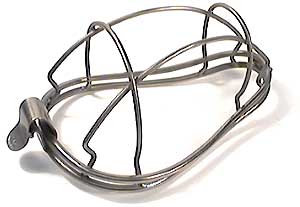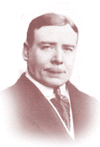Menu
|
Harold Bellamy Gardner
 |
Äthermaske
nach Harold Bellamy Gardner
Die Äthermaske (1908) besteht aus einem Drahtgestell, welches mit
einem feinem Drahtgeflecht überzogen wird. H. Bellamy Gardner schlug
vor, eine Unterlage für die Maske zu erstellen, indem man mehrere
Gazelagen rollt und sie zu einem Oval formt. Der Äther wird mittels
einer beliebigen Tropfflasche auf die Maske geträufelt. |
|
|
Harold
Bellamy Gardner (1869-1943),
Anästhesist am Charing
Cross Hospital, benutzte als erster die Technik des "offenen Äthers" in
England. 1907 veröffentlichte er erstmals seine Experimente.
1896 schrieb Sir Frederic Hewitt, Charing Cross Hospital, in
der Zeitschrift "Practitioners": "With all these
additions to our storehouse of knowledge the question may well
be asked "Why do not deaths from anaesthesia show signs
of diminution?". The reply is that the responsibilities
involved in administering anaesthetics are not yet fully realised,
that the administration is too often placed in the hands of
comparatively unskilled men. The first step should be an educational
one." Das ist eine der ersten Stellungnahmen für
eine selbstständige und wissenschaftliche Anästhesie.
Marmaduke Shield, Assistenzarzt für Chirurgie am St. Georg`s
Hospital, wies allerdings auf Vorurteile und Gefahren hin.
Er beschrieb das angeblich nachlässige und ungeschulte
Verhalten der Anästhesisten vor und während der Operation. "..a
transient application of the stethoscope suffices to ensure
the patient that the "heart is all right". The operator
notices with quiet dismay that the administrator has no gag
at the hand in case for spasmodic closure of the jaws, no forceps
to pull forward the tongue... ." Auch das steigende Ansehen
von H. Bellamy Gardner und die Diskussionen in der "Medical
Times and Gazette" spitzten die Kontroversen zu. Schließlich
wurde der Druck so groß, daß der Fachbereich Anästhesie
als Prüfungsfach in das medizinische Examen aufgenommen
wurde. 1916 veröffentlichte H. Bellamy Gardner das Buch "Manual
of Surgical Anaesthesia". |
|

